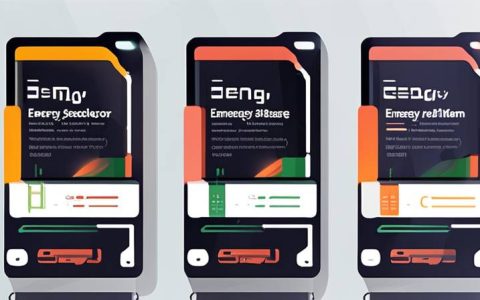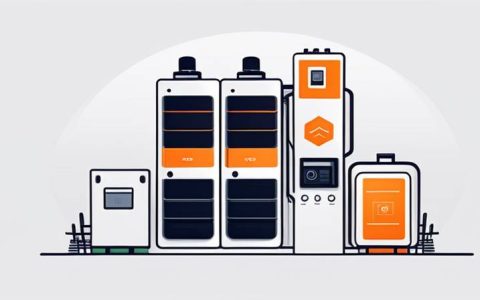
Mobile power storage refers to systems capable of storing energy for portable applications, accommodating the growing need for convenient and reliable energy sources in various environments. 1. Mobile power storage utilizes advanced battery technology, 2. Enhances energy accessibility on-the-go, 3. Plays a vital role in renewable energy integration, 4. Supports diverse applications from personal devices to electric vehicles. Among these points, the capability of mobile power storage to enhance energy accessibility on-the-go is crucial. This technology allows individuals and businesses to utilize energy efficiently and effectively, enabling activities such as outdoor adventures, emergency backup, and powering essential devices when traditional electricity sources are unavailable.
1. INTRODUCTION TO MOBILE POWER STORAGE
The concept of mobile power storage has surged in significance, particularly in today’s fast-paced society where energy demands are paramount. The innovation reflects a significant shift in how energy is perceived and utilized. With the proliferation of mobile devices, electric vehicles, and renewable energy sources, mobile power storage solutions provide essential flexibility and efficiency to users. This technology is engineered to harness, store, and deploy energy wherever and whenever it is needed, circumventing the constraints of traditional energy sources.
As a direct response to the challenges associated with energy consumption, mobile power storage systems are vital for individuals who lead active lifestyles and businesses that thrive on efficiency. The evolution of battery technologies and management systems has enabled these units to become smaller, lighter, and more powerful, thereby advancing their application across a diverse array of fields. Consequently, the exploration of mobile energy storage reflects broader shifts in technological capabilities and societal trends.
2. TYPES OF MOBILE POWER STORAGE SYSTEMS
2.1. PORTABLE POWER BANKS
Portable power banks represent one of the most prevalent forms of mobile power storage. These compact devices are designed to charge smartphones, tablets, laptops, and other electronics on the go. Their convenience and versatility make them indispensable for daily use. Typically, power banks utilize Lithium-ion or Lithium-polymer battery technologies, which deliver high energy density and relatively low weight compared to traditional batteries.
The popularity of power banks can be attributed to their practicality. Individuals can carry them in bags or pockets, making it easy to access energy whenever needed. Moreover, many models come equipped with multiple ports, allowing users to charge several devices simultaneously. The integration of quick charging technologies further enhances their utility, enabling faster energy replenishment for modern gadgets that demand substantial power.
2.2. PORTABLE ENERGY STORAGE SYSTEMS (PESS)
Portable Energy Storage Systems (PESS) provide more robust energy solutions, often incorporating larger battery capacities and smart management features. These systems are ideal for camping, outdoor events, emergency preparedness, or even as backup power in homes. PESS units are often capable of supporting a range of appliances, from small gadgets to larger items like refrigerators or power tools, showcasing their adaptability across various scenarios.
What distinguishes PESS from simpler power banks is their capability to function independently or integrate with alternative energy sources. Many PESS devices include solar panel capabilities, enabling users to charge the battery using sunlight. This feature greatly enhances the sustainability aspect of mobile power storage, allowing for renewable energy usage in remote locations devoid of traditional electrical outlets.
3. THE ROLE OF MOBILE POWER STORAGE IN RENEWABLE ENERGY INTEGRATION
3.1. SOLAR ENERGY SYSTEMS
The integration of mobile power storage with renewable energy systems, particularly solar energy, represents a forward-thinking approach to energy sustainability. As society increasingly turns to clean energy sources, mobile storage units serve as critical components within a broader renewable energy ecosystem. They facilitate the efficient utilization of energy generated from solar panels, particularly during periods of low demand or excess production, which are common in residential setups.
With advancements in technology, solar kits that include mobile storage components have emerged. These kits allow users to easily capture and store solar energy for later use. This mechanism not only provides energy independence but also ensures that solar energy is not wasted. Users can leverage stored energy to power appliances at night or during times when sunlight is not available, enhancing energy availability while reducing reliance on non-renewable sources.
3.2. WIND POWER INTEGRATION
In addition to solar applications, mobile power storage plays an integral role in wind energy utilization. For example, various devices have been developed that combine wind turbines and storage solutions, allowing users to harness energy generated from wind efficiently. This is particularly beneficial in remote areas or during off-grid conditions. The combination of wind energy and mobile storage ensures that energy is captured and stored even when winds fluctuate, helping to stabilize power supply.
This synergy is especially significant for off-grid energy users, such as campers or those residing in rural areas. By taking advantage of the diverse energy generation methods, individuals can achieve consistent power availability. Moreover, the hybrid approach can lead to increased energy cost savings over time, making the investment in mobile power storage viable for many users.
4. BENEFITS OF EMBRACING MOBILE POWER STORAGE TECHNOLOGIES
4.1. ENHANCED ENERGY ACCESSIBILITY
The most compelling advantage of mobile power storage systems is their ability to enhance energy accessibility. In an era dominated by mobile devices, consistent access to reliable energy sources is crucial. Users can avoid the frustration of depleted batteries when engaged in activities where electrical outlets are scarce, such as camping trips or outdoor events.
Furthermore, mobile power storage solutions can alleviate inconveniences associated with travel and connectivity. They empower users to stay connected in environments where traditional forms of energy are limited or unavailable. The ability to effortlessly charge multiple devices helps ensure that individuals remain productive and connected no matter their location.
4.2. EMERGENCY BACKUP POWER
Natural disasters and unexpected outages necessitate the availability of backup power solutions. Mobile power storage systems offer an immediate remedy during such crises. They can provide essential electricity to keep critical devices operational and support necessary appliances, significantly improving safety and comfort for individuals and families.
Moreover, the compact nature of mobile storage devices enables them to be easily transported, allowing users to take them wherever they might be needed most. Equipped with an adequate charging capacity, they can power medical devices, communication equipment, and other vital tools during emergencies, highlighting their life-saving potential.
5. FUTURE TRENDS IN MOBILE POWER STORAGE
5.1. EVOLUTION OF BATTERY TECHNOLOGIES
As technology progresses, the future landscape of mobile power storage is likely to undergo transformative changes. The development of cutting-edge battery technologies will enhance the performance, lifespan, and energy density of mobile storage solutions. Research into solid-state batteries, for example, holds the promise of delivering higher capacities and reduced safety concerns associated with traditional lithium-ion batteries.
Additionally, the continuous push towards miniaturization will enable even more compact devices with extended functionalities. This advancement could lead to products that seamlessly integrate additional features like wireless charging or built-in solar capabilities, catering to users’ evolving preferences for versatility and convenience.
5.2. SMART TECHNOLOGY INTEGRATION
Another significant trend is the rise of smart technology integration within mobile power storage solutions. With the increasing prevalence of IoT devices, the demand for energy solutions that communicate and respond dynamically is apparent. Manufacturers are likely to create systems equipped with remote monitoring and control capabilities, allowing users to manage energy consumption and storage efficiently.
Such smart systems could provide users with valuable insights regarding energy usage, optimizing the distribution of stored energy based on varying needs and preferences. As smart home ecosystems continue to develop, the integration between mobile power storage and home energy management systems could facilitate holistic energy solutions for both everyday users and businesses alike.
6. ENVIRONMENTAL IMPACT OF MOBILE POWER STORAGE
6.1. REDUCING CARBON FOOTPRINT
Mobile power storage technology plays a crucial role in the ongoing effort to reduce global carbon emissions. By facilitating greater reliance on renewable energy sources, these devices contribute to a decrease in the necessity for fossil fuels. As solar and wind energy uptake increases, mobile storage ensures energy is collected and maintained, further pushing societies toward sustainability.
A reduction in dependency on conventional power supply systems correlates strongly with the interception of harmful greenhouse gas emissions. Users adopting mobile power storage tend to embrace cleaner energy practices, supporting the transition to a more eco-friendly power landscape that emphasizes sustainable energy sources.
6.2. PRODUCT LIFECYCLE AND RECYCLABILITY
The environmental implications of using mobile power storage also extend into product lifecycle practices. As the demand for these technologies grows, responsibility for lifecycle management will become paramount. Manufacturers are beginning to recognize the importance of designing products that are recyclable, promoting practices that minimize environmental impacts and address waste management issues.
Additionally, efforts to establish recycling programs for lithium-ion batteries have gained traction, encouraging users to responsibly dispose of outdated components. This proactive approach not only helps mitigate adverse environmental impacts associated with battery disposal but also advances the development of a circular economy, ensuring that valuable materials are reused and reprocessed effectively.
QUESTIONS AND ANSWERS
WHAT ARE THE ADVANTAGES OF USING MOBILE POWER STORAGE?
Utilizing mobile power storage offers numerous advantages that cater to the diverse needs of contemporary society. Firstly, mobility remains a prime benefit, enabling users to charge their devices anytime, anywhere, enhancing convenience during travel or outdoor activities. This aspect is crucial for professionals who depend on a constant power supply for business operations.
Moreover, mobile storage solutions can often double as emergency backup systems. During power outages or natural disasters, having a reliable source of stored energy ensures the continued operation of critical devices and appliances, contributing to improved safety and security. These systems also play a significant role in facilitating the use of renewable energy sources, thus allowing users to harness solar or wind energy sustainably and cost-effectively. By capitalizing on these technologies, individuals can reduce their reliance on traditional power grids, leading to potential cost savings and a lower overall carbon footprint.
HOW DOES MOBILE POWER STORAGE WORK?
Mobile power storage systems primarily function by energy capture, storage, and deployment mechanisms. Initially, these systems harness energy from various sources, such as conventional electricity outlets, solar panels, or wind turbines, converting it into usable electrical power. This energy is then stored within high-capacity batteries, ensuring it is readily available for future use.
When a user connects a device to a mobile power storage unit, the system releases the stored energy to charge the connected device or power applications. Smart technology integration often enables users to monitor energy levels and usage via accompanying applications, ensuring optimal management of stored energy. As battery technology continues to evolve, newer systems may offer even greater efficiencies in energy capture, storage, and usage, paving the way for future advancements in mobile power storage.
WHAT IMPACT DOES MOBILE POWER STORAGE HAVE ON RENEWABLE ENERGY USAGE?
The impact of mobile power storage on renewable energy utilization is profound. By effectively bridging the gap between energy generation and consumption, mobile storage solutions enable users to capitalize on renewable energy sources like solar and wind. This capability ensures that energy generated during high production times can be retained for later use, significantly improving energy independence and sustainability.
Integrating mobile power storage systems with renewable energy helps reduce reliance on traditional fossil fuel sources, thus contributing to a lowered carbon footprint and a smaller environmental impact. As more individuals and businesses adopt mobile power storage technologies, the push towards sustainable energy practices will continue to gain momentum, further promoting the transition to cleaner energy solutions.
In summary, the significance of mobile power storage in today’s energy landscape cannot be overstated. As technology progresses, these systems are evolving to meet the demands of diverse users, providing crucial solutions for energy accessibility, sustainability, and convenience. The advent of advanced battery technologies and smart integrations will shape the future of this field. By embracing mobile power storage, society can make substantial strides towards a greener and more efficient energy future.
Original article by NenPower, If reposted, please credit the source: https://nenpower.com/blog/what-is-mobile-power-storage/











